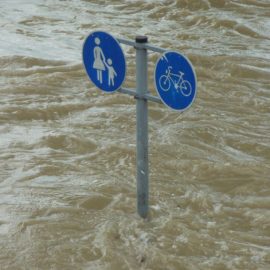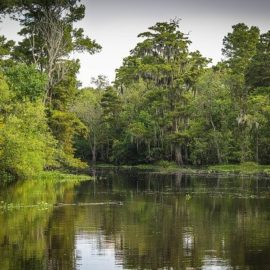
We are not linked with France for clean energy solutions.
With French President Emmanuel Macron looking on, Louisiana Gov. John Bel Edwards and French Minister for Europe and Foreign Affairs Catherine Collona signed an agreement Friday afternoon outlining how their two governments will assist each other in the development of climate-friendly energy sources. The aim is “to assist the companies in their respective countries to identify potential cooperation partners, seek available financing sources and support research activities necessary for the development of their cooperation,” according to the memorandum of understanding. As part of the agreement, France will send an “international technical expert” to Louisiana to work with state agencies, including the Governor’s Carbon Initiatives Task Force and the Louisiana Department of Economic Development. The goal is to identify French industries that might want to work on carbon reduction initiatives in Louisiana, and Louisiana industries that might want to work on similar initiatives in France. The French Ministry for Europe and Foreign Affairs will assist in those efforts.
nola.com
This is a first for France in a couple of areas and we benefit. I hope that the new governor will keep this going.
France has established up to five international technical expert positions a year around the world. This is the first one dedicated to the energy sector, to energy transition and climate change, and the first based in Louisiana. The memorandum, signed at the Historic New Orleans Collection in the French Quarter, asserts that Louisiana “is the American state most affected by climate change, having faced numerous violent hurricanes, coastal erosion, and rising water levels.” Since we adopted our Climate Action Plan earlier this year, we have seen an outpouring of interest in low carbon economic development projects and other new partnerships that will strengthen our state’s economy and help us do more to adapt to the impacts of climate change,” Edwards said in a news release. “This agreement with France is a shining example of how two historic partners can grow closer by confronting one of the world’s biggest challenges together.”
Much of the effort is not to stop but to go to low carbon.
Much of the state’s climate plan is focused on how best to switch carbon-based fuels to low-carbon and non-carbon sources in the production of electricity. The plan also explores permanent storage of carbon emissions in underground formations, and greater use of solar, wind and nuclear energy. The agreement fits in with what Louisiana has dubbed its three “policy pillars” for reducing the state’s greenhouse gas emissions to “net zero” by 2050: Increasing the state’s supply of renewable electricity, Shifting industrial processes and equipment to electric power and Shifting high-heat industrial processes to sustainably produced hydrogen. Both French and Louisiana companies interested in the efforts will be identified, and will be provided with technical support needed for joint projects, including help in identifying funding and institutional contacts in the two countries. Both nations will host visits from interested companies.
Universities will be used which is a good idea.
The French expert also will “pursue and encourage” development of research by Louisiana universities into renewable energy, and also will monitor developments in France and Louisiana related to law and policy, emerging best practices, and economic, technological, and scientific progress in the energy sector. According to Chip Kline, chairman of the state’s Coastal Protection and Restoration Authority, it has not yet been determined how the French expert will split work time between the offices of the authority, the Economic Development department and the office of the French Consulate in New Orleans. Louisiana Economic Development Secretary Don Pierson said France represents the state’s second-largest foreign job creator, responsible for more than $1 billion in trade each year. “As we continue to pursue economic development projects in clean energy and prepare our economy for a low-carbon future, the opportunities to share information and explore joint ventures with French corporations can only increase our economic relationship,” he said.
France also has coastal communities w=hich can suffer from sea rise.
Kline pointed out that France’s coastal communities and landscapes can benefit from coastal protection and restoration from storms, sea level rise and other man made and environmental factors that are familiar challenges to Louisiana communities. “CPRA has always believed that part of its mission is to share what we and our partners in the private sector, research institutions, and non-profits have learned along our coast with other parts of the country and the world who are facing similar challenges,” he said. “I believe we have a lot to give and a lot to gain from this partnership.”
Personally I think we can learn from Europe and this is a good entry way.



